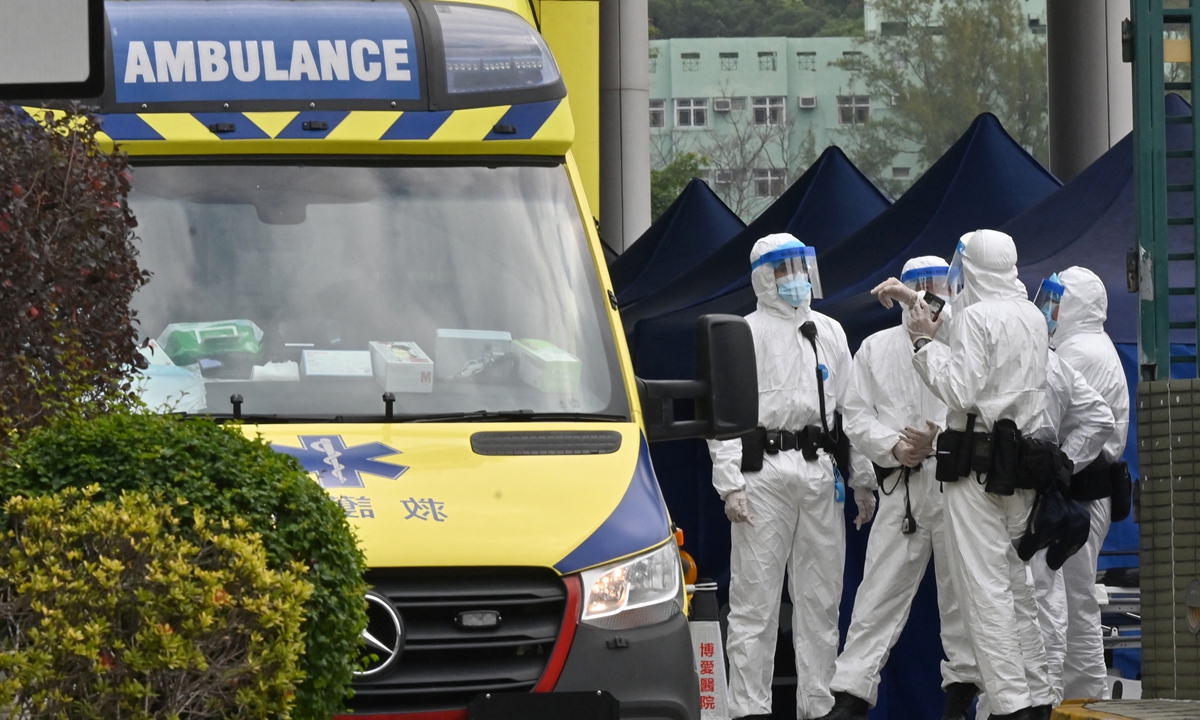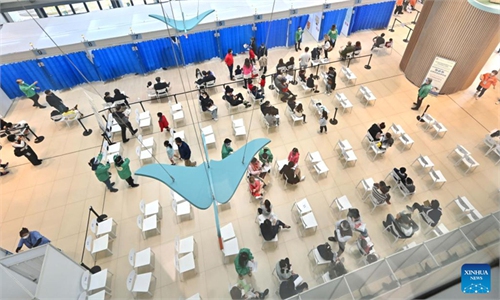How should Hong Kong government play a leading role in anti-pandemic fight: Global Times editorial

Police wearing personal protective equipment (PPE) stand outside the Pok Oi hospital in Hong Kong on Tuesday. Photo: AFP
Hong Kong confirmed 6,107 new locally transmitted COVID-19 cases on Thursday and 24 more deaths. The number of confirmed cases in this wave of the epidemic has exceeded the total of the past two years, and the death toll is also rising rapidly. It is Hong Kong's overriding task to stabilize and control the epidemic as soon as possible.
Central government departments and experts, Guangdong Province and Hong Kong Special Administrative Region (SAR) government have established a tripartite coordination mechanism to support Hong Kong's fight against COVID-19 and ensure the supply of materials to the city. This mechanism has already been put into operation. With powerful actions, the attitude of the central government and Chinese mainland society to fully support Hong Kong's anti-epidemic fight is very clear. This has injected great encouragement and confidence in Hong Kong society to fight the epidemic.
Some practical difficulties in Hong Kong's anti-epidemic work remain, including how to boost large-scale testing capability to find the chain of infections and all potential cases as soon as possible, how to ensure that all mild and severe patients can be classified in a scientific approach, isolated and treated in a timely and effective manner, and how to coordinate medical resources and supportive resources from community to effectively mobilize all sectors of Hong Kong society to participate in the fight against the epidemic, how to resolve the issue of not enough nucleic acid tests resources that are put in place, insufficient vaccination staff and inadequate livelihood guarantee in the isolated sites, etc.
To solve these problems, it is not enough to rely only on the support of the central government and the Chinese mainland. The key is that "the Hong Kong SAR government must shoulder the main responsibility" and mobilize all forces and resources that can be mobilized, including the huge team of the civil service, the health sector, the education sector, the business sector, other people from all walks of life, and grass-roots organizations, to unite them to overcome the difficulties together.
The effect of the SAR government's anti-epidemic approach will depend on two aspects - the government's executive power, and cooperation of society. Hong Kong used to follow the Western-style governance logic of "small government, big society." However, in this pandemic, which is sweeping the world, the serious flaws in this systematic model have been clearly witnessed. In the US and some Western countries, no official has been held accountable for failing to respond to the country's epidemic. The inevitable result of the officials' irresponsibility is the passive anti-epidemic manner, which is equivalent to lying flat in the face of the virus. Politicizing the pandemic has ripped the society, making society pay a heavy human rights and humanitarian price as "some people are eliminated".
Hong Kong is under "one country, two systems," which means that Hong Kong's governance is by no means a copy of the Western model. Now that Omicron is on the rise, the SAR government needs to take stronger and more scientific measures to curb the epidemic if it wants to truly play a leading role. Only when the team of the SAR government has a unified mind, takes responsibility at all levels, and tries its best to unite all walks of life, political parties, and social groups in Hong Kong to make them let go of their previous different views on some public policies, transcend differences in political views and devote themselves to the fight against the epidemic can the SAR government truly assume the main responsibility and speed up Hong Kong's fight against the epidemic faster than the spread of the virus.
It should be noted that although Hong Kong does not have the grid management system as we see in mainland cities, it has its unique advantages, which can be transformed into powerful resources and motivation to fight the epidemic. For example, Hong Kong has a large number of non-government forces such as social groups and private hospitals. They can be mobilized to participate in the fight against the epidemic, but lacking unified arrangements makes it difficult for a large number of private resources to be optimally allocated. The SAR government has the greatest coordination ability. More arrangements should be made to unite all sectors of society, so that non-government forces can penetrate into every corner of communities in Hong Kong and support the SAR government in its fight against the epidemic. Hong Kong hasn't had a joint command center dedicated to responding to the epidemic, which also affects the efficiency of the fight against the epidemic.
Some Western media have used this round of epidemic to drive a wedge, smear the mainland, intimidate Hong Kong, and try to pull Hong Kong into the quagmire of "coexisting with the virus." At the same time, some in Hong Kong also blindly believe in Western model. However, with the number of confirmed cases breaking new highs, Hong Kong society's call for solidarity in fighting the epidemic is getting louder and more urgent. Hong Kong has professional medical and public health teams, which is the pillar that the SAR government relies on to lead the fight against the epidemic and assume the main responsibility. There are about 170,000 civil servants in Hong Kong, and several legislators are calling on all of them to "mobilize."
At this critical moment in Hong Kong's fight against the epidemic, the most precious thing is confidence, the most important thing is unity, and the most urgent thing is action. For the more than 7 million people in Hong Kong, the top priority is to unify their thinking, get rid of the noise, fight the epidemic together to ensure safety and health of Hong Kong people. We believe that with the full support of the central government and the more resolute and scientific measures of the SAR government, Hong Kong will be able to tide over the difficulties.


